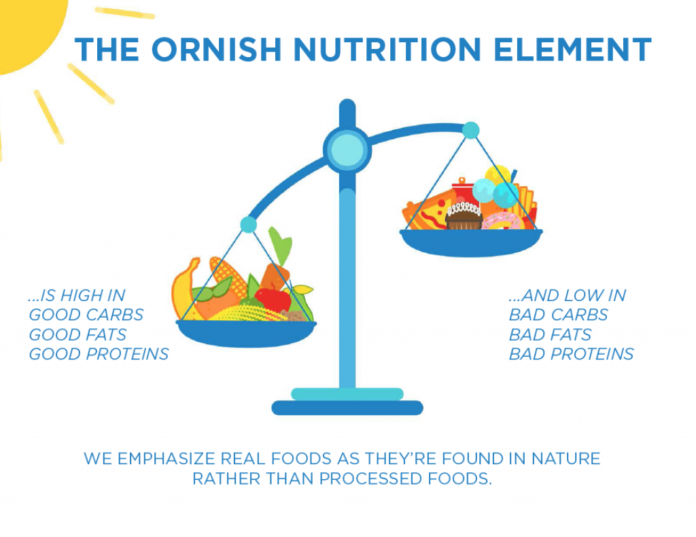I was once asked which foods I like the most. Sure, I have my favorites, but it is an amazing diversity of different food groups that I like the most.
When it comes to nutrition and perhaps the ultimate question – “What should I eat today?” – there is a wide range of opinions.
True, I do not always agree with Dean Ornish’s nutritional philosophy, but he has directed clinical research demonstrating that comprehensive lifestyle changes may stop or even reverse the progression of coronary heart disease and prostate cancer.
He is a respected authority in the field of nutrition and it is the diversity of opinions that makes us better informed about food choices. So I thought you might be interested to take a peek at what Dean Ornish and his family eat on a daily basis.
A Peek Into My Pantry by Dean Ornish, MD.
I’m often asked, “What do you, your wife Anne and six-year-old son Lucas eat every day?” March is National Nutrition Month, so it’s a good time to talk. Let’s dish!
In general, we follow our own advice. Anne and I have worked together for almost ten years, so we tend to eat similar foods.
In general, our meals are based on fruits, vegetables, whole grains, legumes and soy products in their natural forms, with a little fish sometimes.
We tend to cook simply. If we start with really good, fresh organic produce, we don’t have to do much. We spend less time cooking and more time eating together.
Research indicates that the family meal plays a significant role in the health and development of children, including better academic performance and fewer behavioral problems, so we always sit down together.
Here, our diet details:
A good start. We often enjoy a bowl of whole-grain cereal with soy milk and fresh fruit (usually a banana or berries), some whole-wheat toast (plain or with a little jam), and a glass of pomegranate or orange juice.
I usually have a cup of green tea or Earl Grey. Anne prefers coffee. Some days, we’ll make an egg-white omelet and mix in some spinach, mushrooms, or low-fat cheese or a little turmeric, which may have anti-inflammatory benefits.
On weekends, we’ll sometimes treat ourselves to a breakfast of whole-grain pancakes or waffles with a little maple syrup. And every day, we each take a multi-vitamin and fish oil supplements.
Steam it. We often put a few vegetables such as corn, broccoli and cauliflower in the steamer, which is quick and preserves most of the flavor and nutrients. You can add a few prawns or a small piece of fish as well. Add a salad, and you have a complete meal.
Steaming one or more vegetables, such as butternut squash or carrots, and liquefying them in the blender with a little bit of water makes a soup bursting with flavor.
Plain and simple. Many people don’t realize how delicious foods can taste without adding a lot of fat, salt and sugar, which often mask the intrinsic flavors.
If you want a little zing or zip to pump up the flavor, try a squeeze of lemon or a delicate pinch of cumin and other favorite spices.
Speedy suppers. When we’re crunched for time, or when our favorite produce is out of season, we use canned and frozen fruits and vegetables in soups, salads, sauces and casseroles. They’re convenient and have just as much nutritional value as fresh.
Pasta’s not evil. Like many kids, Lucas loves pasta but isn’t crazy about the texture of the healthier, whole-wheat version.
However, what matters is the amount of fiber in the overall meal, not in specific items, so even white-flour pasta is okay, if it’s eaten with high-fiber whole grains such as a whole-wheat pita or barley and vegetables.
Fast-food choices. If we go out to eat we look for the healthier items on the menu. At McDonald’s, for example, we select the Fruit & Walnut Salad or the Asian Salad (which I helped develop).
Need More Proof?
I’m 53 years old, and I’ve been eating this way since I was 19. I’m six feet tall, and my weight stays around 175 pounds. I’m on no medications, and my total cholesterol level has remained below 140 to 150 mg/dl since then.
My LDL ranges from 70 to 80 mg/dl, and my blood pressure is 110/70. But the main reason for eating and living this way is that I feel so much better when I eat healthy. My adolescent allergies and childhood asthma disappeared, and fortunately, I’m rarely ill.
Diet is important, but so is being happy. When I wake up each day with Anne and Lucas, I feel like the luckiest guy in the world. [source: Reader’s Digest, March, 2007]

